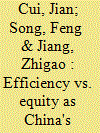| Srl | Item |
| 1 |
ID:
192385


|
|
|
|
|
| Summary/Abstract |
Emissions reduction in the electricity sector is critical in achieving China's carbon neutrality target. While a national carbon trading market that covers the electricity sector has been established, its effectiveness depends on how this sector evolves into being a more integrated market. This study evaluated the impact of China's electricity market integration on the cost-effectiveness of carbon pricing. An integrated (regional electricity market) and a segmented (provincial electricity market) market scenario were used to identify possible reform paths going forward. Using high-frequency datasets of the five southern provinces in 2018, we assessed the impact of electricity market integration on the abatement potential and cost-effectiveness of carbon pricing. We found that carbon prices need to be as high as 200 yuan/ton to begin achieving overall carbon reduction. In this context, the regional market is more cost-effective in reducing emissions than the provincial one, as the abatement costs are saved by around 60% compared to the latter under the same emission reduction targets. However, the regional market may also raise potential equity issues. The provincial-level distribution of carbon emission reductions, as well as the withdrawal of coal power, are more concentrated in the regional market than in the provincial one, which indicates an inequitable social-economic-environmental impacts of market integration. Our research findings would help to improve policymakers' understanding of the interaction between carbon pricing and electricity market reforms. This would then assist them in coordinating an effective design of both the carbon and electricity markets, in addition to supporting China's carbon neutrality target.
|
|
|
|
|
|
|
|
|
|
|
|
|
|
|
|
| 2 |
ID:
167038


|
|
|
|
|
| Summary/Abstract |
China's wind power has experienced explosive growth and reshaped the overall energy mix since 2009. However, increasing investment in the wind power industry has been accompanied by persistent and serious wind curtailment since 2010, leading to significant efficiency loss. This paper argues that the interprovincial market segmentation, which is driven by political motivations, is a key factor contributing to wind curtailment. We first construct an interprovincial electricity market segmentation index. This is then used as an independent variable to explain the variation in wind curtailment rates. A panel dataset of 28 provinces during the 2009–2016 period is used for empirical analysis. The results clearly show that market barriers positively contribute to wind power curtailment. Specifically, a 10% decrease in the market segmentation index will lead to a 4.3–5.3% decrease in wind power curtailment.
|
|
|
|
|
|
|
|
|
|
|
|
|
|
|
|
| 3 |
ID:
116961


|
|
|
|
|
| Publication |
2012.
|
| Summary/Abstract |
We employ decomposition analysis and econometric analysis to investigate the driving forces behind China's changing energy intensity using a provincial-level panel data set for the period from 1995 to 2009. The decomposition analysis indicates that: (a) all of the provinces except for a few experienced efficiency improvement, while around three-fourths of the provinces' economics became more energy intensive or remained unchanged; (b) consequently the efficiency improvement accounts for more than 90% of China's energy intensity change as opposed to the economic structural change.
The econometric analysis shows that the rising income plays a significant role in the reduction of energy intensity while the effect of energy price is relatively limited. The result may reflect the urgency of deregulating the price and establishing a market-oriented pricing system in China's energy sector. The implementation of the energy intensity reduction policies in the Eleventh Five-Year Plan (FYP) has helped reverse the increasing trend of energy intensity since 2002. Although the Chinese Government intended to change the industry-led economic growth pattern, it seems that most of the policy effects flow through the efficiency improvement as opposed to the economic structure adjustment. More fundamental changes to the economic structure are needed to achieve more sustainable progress in energy intensity reduction.
|
|
|
|
|
|
|
|
|
|
|
|
|
|
|
|